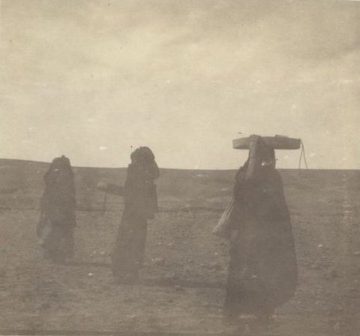Najwa al-Qattan at Public Books:
 In the days leading up to the Muslim holiday of the Feast of Sacrifice (Eid al-Adha) in October 2013, several Syrian clerics issued a fatwa (a religious opinion or responsum) allowing—in several besieged and starved suburbs of Damascus—the consumption of cats, dogs, and donkeys killed in bombings. The fatwa, publicly announced from mosques and uploaded on YouTube, came in the context of war- and siege-induced food scarcities and starvation.1 It was not the first; over the previous year, similar fatwas had been issued in other besieged areas, including Aleppo, Homs, and Yarmouk, the largest Palestinian refugee camp in Syria. But there was poignancy to the timing of this fatwa: on this holiest of Muslim eids, believers all over the world celebrate the end of the Hajj, in part by the slaughtering of a sacrificial animal (and sharing its meat with the needy) in homage to the Prophet Abraham. But in this war, as was the case a century ago, it is the Syrian civilians that are being sacrificed.
In the days leading up to the Muslim holiday of the Feast of Sacrifice (Eid al-Adha) in October 2013, several Syrian clerics issued a fatwa (a religious opinion or responsum) allowing—in several besieged and starved suburbs of Damascus—the consumption of cats, dogs, and donkeys killed in bombings. The fatwa, publicly announced from mosques and uploaded on YouTube, came in the context of war- and siege-induced food scarcities and starvation.1 It was not the first; over the previous year, similar fatwas had been issued in other besieged areas, including Aleppo, Homs, and Yarmouk, the largest Palestinian refugee camp in Syria. But there was poignancy to the timing of this fatwa: on this holiest of Muslim eids, believers all over the world celebrate the end of the Hajj, in part by the slaughtering of a sacrificial animal (and sharing its meat with the needy) in homage to the Prophet Abraham. But in this war, as was the case a century ago, it is the Syrian civilians that are being sacrificed.
more here.
